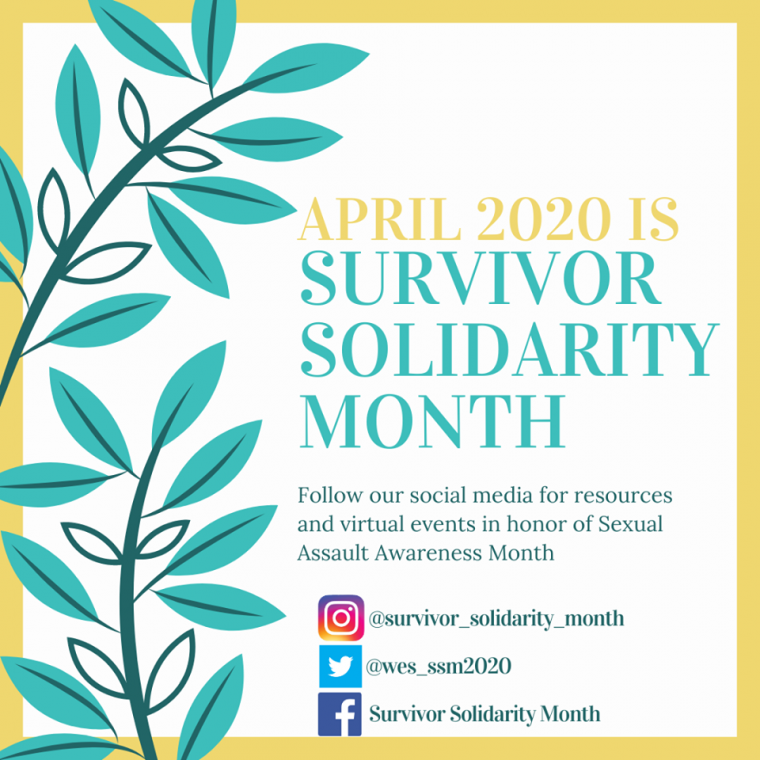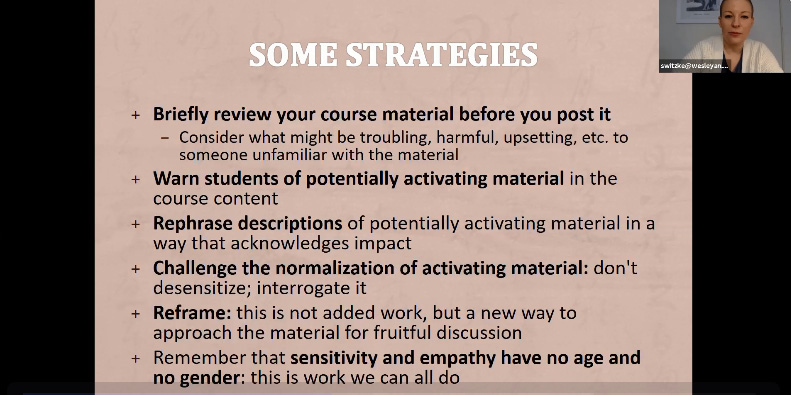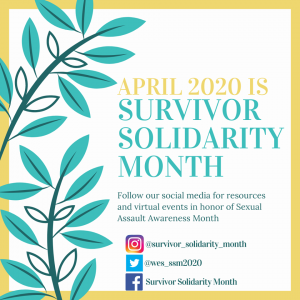SACE Hosts Survivor Solidarity Month Activities, Offers Resources



Throughout the month of April, the Office of Survivor Advocacy & Community Education (SACE) is hosting Survivor Solidarity Month 2020, a monthlong series of events focused on centering survivors of interpersonal violence.
“The goal is to start conversations on our campus about how we support survivors in our community, and how to prevent interpersonal violence from happening in the first place,” said Johanna DeBari, director of SACE. “While previously this consisted of many workshops engaging in community dialogue, we’re moving to reimagine what this dialogue looks like in a world of social distancing and virtual classrooms.”
The month of events kicked off on March 31 when DeBari and Serena Witzke, visiting assistant professor of classical studies, co-facilitated a webinar on “Trauma-Informed Support in the Virtual Classroom.” Witzke is an expert on social hierarchies and how they affect ancient women and men, particularly the ways that subaltern figures (women, enslaved persons, non-citizens) work to benefit themselves by negotiating the power structures that limit them.
The group discussed thoughts on presenting potentially traumatic material with empathy and how to be sensitive to trauma in the virtual classroom environment, and offered resources for students and faculty.
April 29 is Celebrate Denim Day! Wear jeans or denim to challenge victim blaming stereotypes and support survivors. Share a picture on social media with an example of how you’re going to support survivors in your life (that you may or may not know).
April 30 is (a Virtual) Take Back the Night Event! Join survivors, advocates, and allies for an international commemoration of Take Back the Night, virtually. Sponsored by the Take Back the Night Foundation, the event historically is hosted at night to call attention to the prescription that female-identifying folks should not walk alone at night, in order to avoid experiencing sexual violence. This protest aims to challenge victim-blaming stereotypes and re-center the conversation on supporting survivors. To participate at 8 p.m. on April 30, register here!
In addition, SACE offers these educational and supportive resources to review and keep in mind throughout the month:
-
- Wesleyan’s Employee Assistance Program can help faculty and staff members navigate difficult conversations, provide educational materials, or connect with community resources or counselors.
- New Horizons Online Support Group can help women who have experienced domestic violence/intimate partner violence.
- Healthy vs. Unhealthy Relationships
- Title IX Options for Reporting and Support Poster
- Office of Survivor Advocacy and Community Education Resource Website
To make a difference during Survivor Solidarity Month, SACE and the Faculty and Staff Survivor Solidarity Month Planning Committee has offered these suggestions:
Check in with a Survivor
Navigating the impacts of COVID-19 and feelings of uncertainty may be activating for survivors. Check in with a survivor you know: Send them a love note, offer to connect over the phone, share some resources in your community. Remind them they’re not alone.
Be a Critical Media Consumer
When you’re watching the latest Neftlix series, or a movie with your family, bring a critical eye. Notice microaggressions related to race, gender, class, or other identities. Pay attention to how myths and stereotypes of interpersonal violence are emphasized. Challenging all of the ways interpersonal violence is normalized is key to preventing violence.
Share a Resource List
We don’t always know those of our friends, family, or community members who are survivors. Sharing information about support resources generally on social media, or otherwise, can open the door to enabling someone to get help, even if we don’t know they need it.
Practice Self-Care
Holding space for survivors is “heart-work.” It takes a lot of emotional energy, and can lead to vicarious trauma. Take care of yourself to practice activities that are restorative and healing for you. Caring for ourselves allows us space to care for others.
Start a Conversation with Your Family
Whether your family is in your household, across the country, or in another country, engage your family in a dialogue about consent and healthy relationships. What does a healthy relationship look like? How can we define consent?
Donate a Self-Care Kit
SACE is encouraging the Wesleyan community to order and ship donations directly to Wesleyan’s local rape crisis center, Women and Families Center (169 Colony Street, Meriden, CT 06451) to support survivors in the local community. Suggested donations include sweatshirts or sweatpants of gender-neutral colors, toothbrushes, toothpaste, deodorant, non-alcohol mouthwash, socks, and a stuffed animals. “These items complete self-care kits after [a victim has gone] to the hospital for an evidence collection kit,” DeBari said.
For more information, resources, and updates about upcoming events, see the SACE Office website, or follow SACE on Instagram @wessaceoffice and Facebook @WesSACEOffice.

